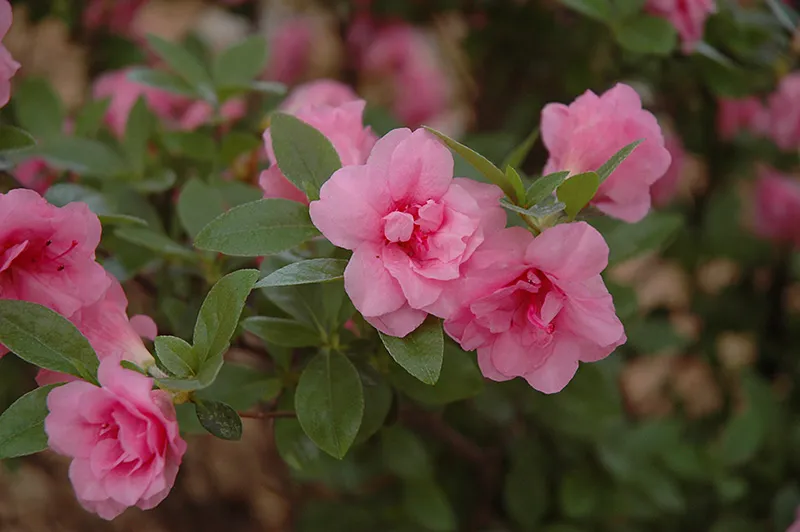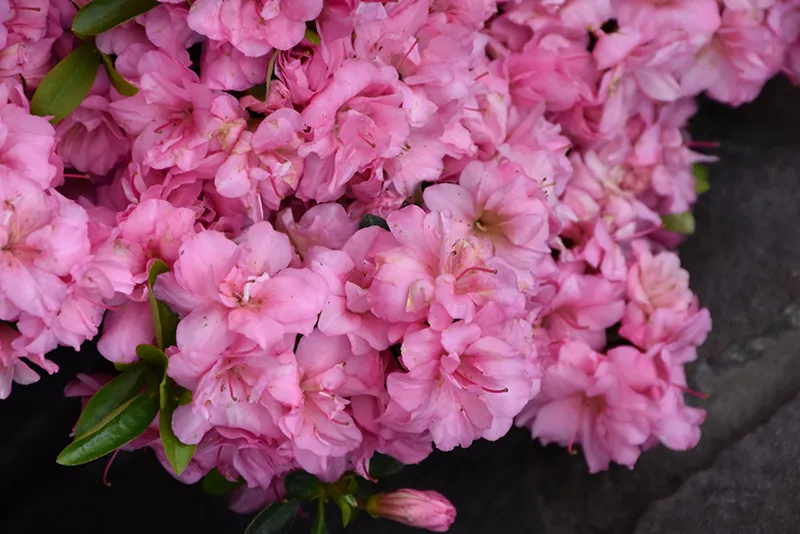Family: Azalea
Type: Shrub

The Rosebud Azalea is a stunning deciduous shrub known for its spectacular flowers that resemble rosebuds before they fully open. This azalea variety is cherished for its vibrant blooms that come in shades of pink, red, and white, making it a showstopper in any garden. Its compact growth habit and glossy, green leaves add to its appeal, providing a lush backdrop for the floral display.
Ideal for small gardens and borders, the Rosebud Azalea thrives in partial shade and well-drained, acidic soil. It’s a perfect choice for adding a splash of color in spring, attracting pollinators such as bees and butterflies to the garden. The plant’s ability to produce an abundance of flowers each year makes it a favorite among garden enthusiasts.
Beyond its beauty, the Rosebud Azalea is relatively easy to care for, requiring minimal maintenance once established. It is resistant to many pests and diseases, making it a durable addition to the landscape. Whether planted as a single specimen or in groups, this azalea can turn any garden into a vibrant display of color and texture.
Hardiness Zone: 4b-9b
Pet Friendly: Yes
Moisture Preference: Moist
Sun Needs: Full sun to partial shade
Growth Rate: Slow
Average Height (feet): 8
Average Spread (feet): 8
Average Life Span (years): 40
Form: Upright spreading
Flower Color: Pink
Flower Eye Color: Red
Flower Shape: Trumpet
Bloom Season: In mid spring
Foliage Color: Green
Leaf Fall Color: Yellow
Foliage Shape: Narrow
Bark Color: Gray
Bark Texture: Smooth
Incorporating Rosebud Azalea into your landscape design can create a focal point of vivid color and elegant form. Planting it along pathways or in front of evergreen backdrops can highlight its stunning blooms and lush foliage. Its compact size makes it suitable for both ground planting and container gardening, offering flexibility in design.
Pairing Rosebud Azalea with other shade-loving plants, such as ferns and hostas, can create a layered, textured garden space. The contrast between the azalea’s bright flowers and the subtle greens of companion plants adds depth and interest to shady garden areas. This combination is perfect for woodland gardens or shaded borders.
For a continuous bloom sequence in your garden, combine Rosebud Azalea with early spring bulbs and late-flowering perennials. This ensures that the garden remains vibrant from early spring through fall, with the azalea’s springtime blooms initiating the colorful display. Such planning turns your garden into a succession of floral highlights throughout the growing season.

The Rosebud Azalea fits seamlessly into the cottage garden style, adding charm and color with its rose-like flowers. Its informal growth habit and colorful display complement the relaxed and abundant feel of cottage gardens.
In a woodland garden, Rosebud Azalea enhances the naturalistic setting with its bright blooms and lush foliage. It mimics the undergrowth of a forest, providing color and life beneath tree canopies.
The structured form and vibrant colors of Rosebud Azalea can also find a place in formal gardens. Used as accent planting or in symmetric designs, it adds elegance and visual interest to formal settings.
Create a stunning border by planting Rosebud Azalea alongside a garden walkway. Its blooms will welcome visitors with vibrant color and a gentle fragrance, making every stroll a delightful experience.
Design a serene meditation garden by incorporating Rosebud Azalea with other calming elements like smooth stones, water features, and soft-textured plants. The azalea’s vivid blooms and soft petals contribute to a peaceful retreat atmosphere.
Use Rosebud Azalea in container gardens to brighten shaded patios or balconies. Its compact growth and spectacular blooms make it an excellent choice for adding a pop of color to smaller, shaded outdoor living areas.
Select our pre-made garden layouts to create a landscape that’s uniquely yours. Simple, smart, and customizable!
In spring, Rosebud Azalea comes to life with an explosion of colorful blooms that cover the plant, making it a standout feature in the garden. This is when it truly shines, marking the season with its vibrant presence.
After blooming, the Rosebud Azalea's foliage remains attractive, providing a rich, green backdrop for summer perennials. Its leaves keep the garden feeling lush even after the flowers have faded.
In fall, the foliage of some Rosebud Azalea varieties may turn to attractive autumn hues, adding a new layer of interest to the garden as the season changes.
During winter, the Rosebud Azalea's structure and form become more pronounced in the landscape, offering visual interest even without its leaves. Its branches and shape can catch snow, adding beauty to the winter garden.
Rosebud Azalea thrives in partial shade to full sun locations. For optimal bloom, plant where it can receive morning sunlight and afternoon shade, especially in hotter climates.
This azalea variety performs best in partial shade. While it can tolerate full sun in cooler regions, too much direct sunlight can stress the plant and lead to scorched leaves.
Rosebud Azalea requires well-drained, acidic soil rich in organic matter. Amending the planting area with compost or peat moss can help create the ideal growing conditions.
Space Rosebud Azalea plants about 3-4 feet apart to allow for their mature spread and ensure proper air circulation, promoting overall plant health.
The best time to plant Rosebud Azalea is in the spring or early fall. Cooler temperatures help the plant establish roots without the stress of extreme weather conditions.
Dig a hole twice as wide and just as deep as the root ball. Place the azalea in the hole, ensuring the top of the root ball is level with the soil surface. Backfill with soil, water thoroughly, and apply a layer of mulch.
Maintain evenly moist soil, especially in the first growing season to establish a deep, extensive root system. After establishment, Rosebud Azalea can tolerate occasional dry spells but prefers consistent moisture.
Fertilize in early spring with an acid-forming fertilizer designed for azaleas. Avoid over-fertilizing, which can damage the plant.
Prune immediately after flowering to shape the plant and remove any dead or diseased wood. Azaleas set next year’s flower buds shortly after blooming, so early pruning ensures blooms for the following year.
Apply mulch to conserve moisture and apply a balanced, acid-forming fertilizer as new growth appears. This is also the time to prune for shaping.
Keep the soil moist during dry periods. Monitor for pests and diseases, treating as necessary to keep the plant healthy.
Prepare the azalea for winter by applying a fresh layer of mulch to protect the roots. Reduce watering as the plant begins to go dormant.
No special care is needed in winter for Rosebud Azalea in its hardiness zones. Ensure it's well-mulched to protect against freezing temperatures.
Yes, Rosebud Azalea can be successfully grown in containers using a well-draining, acidic potting mix. Ensure the pot has adequate drainage holes.
Rosebud Azalea grows at a moderate rate, typically reaching its full size of 3-4 feet tall and wide within 5-7 years under optimal growing conditions.
While no plant is completely deer-proof, Rosebud Azalea is less palatable to deer compared to many other garden plants. However, in areas with high deer pressure, protective measures may be necessary.
Sign up below to get exclusive deals, discounts, and new plant collections—delivered straight to your inbox! Plus, stay inspired with the latest gardening tips, landscaping trends, and DIY garden ideas. Start growing with us today!
A big thank you for subscribing to the PBN Design newsletter.
We're thrilled to have you join our community. Get ready for exciting updates, insightful content, and more delivered straight to your inbox.
Stay tuned!
Go backA big thank you for subscribing to the PBN Design newsletter.
We're thrilled to have you join our community. Get ready for exciting updates, insightful content, and more delivered straight to your inbox.
Stay tuned!
Go back